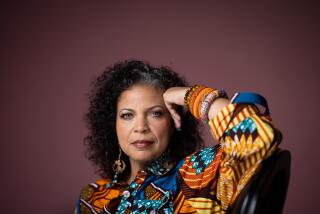Reaching Out to Educate Youth Is a Priority for Local NAACP
The Rev. Zedar E. Broadous this year was elected president of the Valley chapter of the National Assn. for the Advancement of Colored People. Broadous, a lifelong resident of the Valley, is the father of six children and grandfather of six. He lives in Pacoima and owns a graphics and printing company. He was interviewed by staff writer Jocelyn Y. Stewart.
Q: As the new head of the NAACP, what are your priorities?
The NAACP has always fought racial injustice and discrimination, but as a local branch we have to look at our community and see what we need here. I feel we need to work closer with those people who have not received the educational advantages of others. We need to deal with the drugs in our communities and the violence. Those are things that affect the Valley immediately.
Q: The NAACP has been criticized for being out of touch with some of the problems facing young people today. Are these criticisms valid?
It’s not so much that the organization is out of touch, it’s that people are out of touch with the organization. The NAACP has been fighting this fight for almost 100 years, since 1909. What happened with Rodney King was something the organization has been fighting against since 1909, and it was fighting before Rodney King got beat up. Since Rodney King we’ve fought other cases of the same nature. So it’s not like it’s something new for us.
Q: Benjamin Chavis, the new executive director of the NAACP, recently visited a group of students in South Los Angeles. In speaking with the teen-agers, Chavis learned that only a handful had even heard of the NAACP. Why is it that young people are unaware of an organization that carries the historical weight the NAACP carries?
Here in the Valley, I’m not going to say that all the young people or even all the adults know about the NAACP. But we have what we call Martin Luther King Day. This year I think we had almost a thousand young people, along with adults, that participated in our program. So that’s a thousand that do know about the NAACP here in the Valley, and using a marketing equation if I only give each one of them two people that they’ve talked to then that’s three thousand. . . . We can forget about a lot of things unless those things are brought to our remembrance, and the NAACP must stay in the forefront.
Q: How do you plan to bring more young people into the organization?
Our youth council has not been active in quite some time. We’re going to make it very active, and in making it active we’re going to make it a place where they can receive education. We’ll be more visible than before, and we’re going to move into better technology. Our technology and marketing has not kept up with the modern day and times. You have to market yourselves. You have to let people know that you exist, because there are other things out there that are bombarding their brains, and if you’re not bombarding too, then people just don’t know anything about you.
Q: What kind of technology are you referring to?
When I say technology I’m talking about using the media, using radio, television, videos--those things that are a part of our society now--to educate our people, our society really. We have to continue to let people know we exist and that their membership is just as important as a membership in the Democratic Party. I don’t know many of us who go to Democratic Party meetings, but we’re either Democrat or we’re Republican and we’re registered, so that’s our membership. They use those numbers to have political clout.
Q: What do you think of the proposal to break up the Los Angeles Unified School District? I see it as a detriment to the African-American community. I don’t see that it would be conducive to our learning. We fought too long for what we have, the little bit that we have. To break up the school district would be moving back to what it used to be, total inequality in education. I can see it becoming very unequal. Maybe not today, maybe not tomorrow, but down the road I can see it becoming very unequal.
Q: What is your view of community policing?
If I know the police and the police know me, then we have better respect for each other. I’ve looked at the officers that I know here in the Valley who are working in community-based policing, and you see a different kind of attitude toward the people. That begins to humanize the people as well as the people seeing that the police officers are human.
Q: The Rodney King beating and the two trials that followed have been the focus of national and international media attention. Is that where the energy of the African-American community should be focused?
Right now we’re looking at Rodney King, everybody’s talking about the verdict. Yet we’ve got some major problems we need to deal with. What happened to Rodney King happened the day before, and it happened the day after to somebody else, and some other things are going to happen to somebody else. Yes, we want justice. But we need to keep our focus on the whole and not just a piece of the pie. Rodney King is important, the trial is important, but it’s not the whole pie. There’s a lot of work that needs to be done, and that’s why I need membership.
More to Read
Sign up for Essential California
The most important California stories and recommendations in your inbox every morning.
You may occasionally receive promotional content from the Los Angeles Times.










